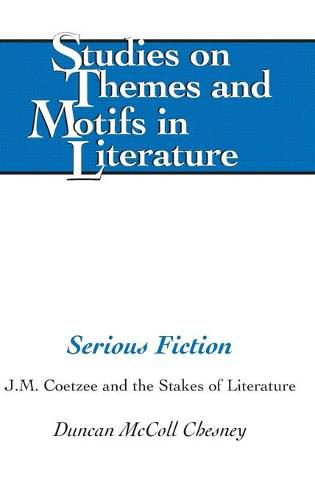Readings Newsletter
Become a Readings Member to make your shopping experience even easier.
Sign in or sign up for free!
You’re not far away from qualifying for FREE standard shipping within Australia
You’ve qualified for FREE standard shipping within Australia
The cart is loading…






This title is printed to order. This book may have been self-published. If so, we cannot guarantee the quality of the content. In the main most books will have gone through the editing process however some may not. We therefore suggest that you be aware of this before ordering this book. If in doubt check either the author or publisher’s details as we are unable to accept any returns unless they are faulty. Please contact us if you have any questions.
Serious Fiction explores the novels of J.M. Coetzee, in dialogue with key works of the European literary tradition and several contemporary masterworks of world literature, in order to flesh out an ethico-aesthetic ideal for the contemporary novel. Serious refers back to the Aristotelian definition of tragedy to revive a certain communal, political-ethical task of the artwork; fiction, also referring back to Aristotle and the subsequent poetic tradition, stresses the element of play in the artwork in contrast to the seriousness of the world of daily survival, business, and life. Following post-Enlightenment thinkers from Schiller and Arnold to Leavis and Auerbach, as well as more contemporary literary theorists, the argument maintains a delicate balance between seriousness as a sort moral criterion of literary assessment and playfulness as a necessary stage in the creation of any artwork, adding the formal and epistemological obligations of the realist novel as the dominant literary genre of the long nineteenth century. Coetzee is presented as a contemporary model of serious fiction writing, balancing elements of realism and play/imagination, tragedy and the prosaic, aesthetic semi-autonomy and ethical responsibility. Major works by Coetzee are discussed - Waiting for the Barbarian, Life & Times of Michael K., Disgrace, Diary of a Bad Year - as well as other of his works, fictional and non-fictional, along with important traditional and contemporary works by Tolstoy, Dostoevsky, Joyce, Kakfa, and Beckett as well as Imre Kertesz, W.G. Sebald, Eimear McBride, Cormac McCarthy, Jiang Rong, and others.
$9.00 standard shipping within Australia
FREE standard shipping within Australia for orders over $100.00
Express & International shipping calculated at checkout
This title is printed to order. This book may have been self-published. If so, we cannot guarantee the quality of the content. In the main most books will have gone through the editing process however some may not. We therefore suggest that you be aware of this before ordering this book. If in doubt check either the author or publisher’s details as we are unable to accept any returns unless they are faulty. Please contact us if you have any questions.
Serious Fiction explores the novels of J.M. Coetzee, in dialogue with key works of the European literary tradition and several contemporary masterworks of world literature, in order to flesh out an ethico-aesthetic ideal for the contemporary novel. Serious refers back to the Aristotelian definition of tragedy to revive a certain communal, political-ethical task of the artwork; fiction, also referring back to Aristotle and the subsequent poetic tradition, stresses the element of play in the artwork in contrast to the seriousness of the world of daily survival, business, and life. Following post-Enlightenment thinkers from Schiller and Arnold to Leavis and Auerbach, as well as more contemporary literary theorists, the argument maintains a delicate balance between seriousness as a sort moral criterion of literary assessment and playfulness as a necessary stage in the creation of any artwork, adding the formal and epistemological obligations of the realist novel as the dominant literary genre of the long nineteenth century. Coetzee is presented as a contemporary model of serious fiction writing, balancing elements of realism and play/imagination, tragedy and the prosaic, aesthetic semi-autonomy and ethical responsibility. Major works by Coetzee are discussed - Waiting for the Barbarian, Life & Times of Michael K., Disgrace, Diary of a Bad Year - as well as other of his works, fictional and non-fictional, along with important traditional and contemporary works by Tolstoy, Dostoevsky, Joyce, Kakfa, and Beckett as well as Imre Kertesz, W.G. Sebald, Eimear McBride, Cormac McCarthy, Jiang Rong, and others.